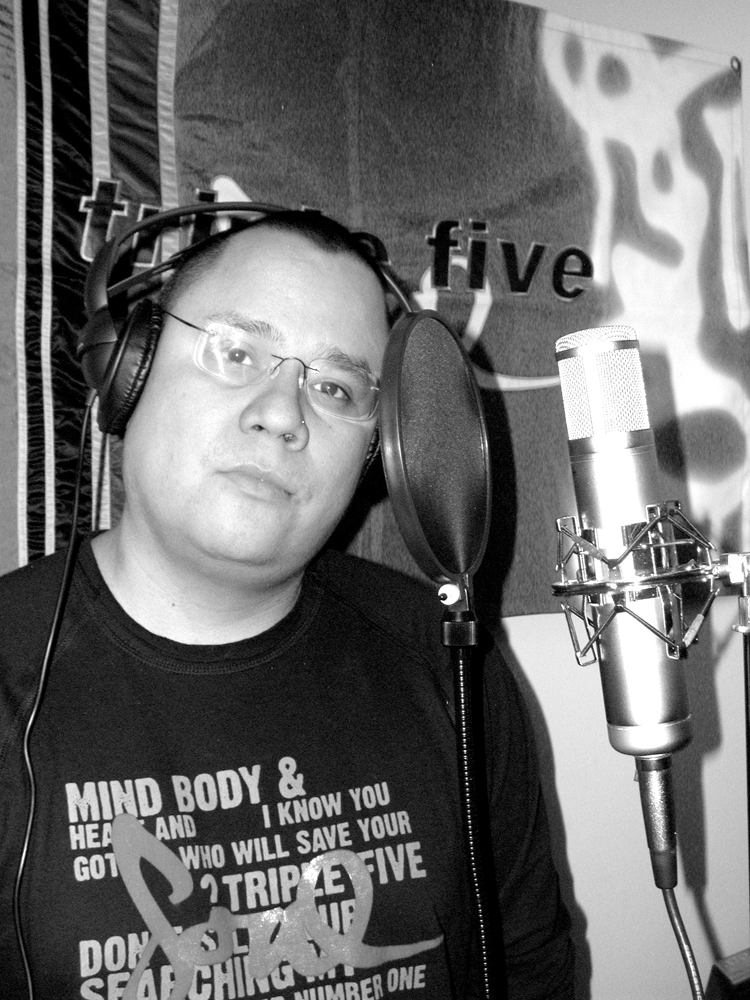
“He may be a man of humble origins, but for rapper, award-winning producer, emcee, director, editor, and graphic designer Daybi, things are just beginning to heat up. The Nation caught up with him earlier this year to see what kinds of hot projects he has on the burner, what it takes to be such a multifaceted artist and how he got there.
He set up shop in Montreal after moving from Kahnawake last year and since then he has been enjoying his anonymity. “I am still very low profile here, which I love, being able to just keep to myself,” he says.
Even in his youth, Daybi showed signs of creativity. His first role model was his father: “I used to sit and watch him draw and then I got into drawing myself.”
It was not until his teens that he began to find his voice, “I started rapping in about ’93,” he says. But at “17 is when I would say that I got really turned onto hip hop culture.” That’s when he started listening to bands like Aceyalone, Mikah 9, Freestyle Fellowship, and CPE.
His first interest in hip hop veered more towards the gangsta rap element. Ironically, music was both his downfall and his salvation.
“I started getting involved in street gangs in Vancouver and doing crime,” Daybi recounts. “You know, kids get into that thing. It sounds really kinda cliché about hip hop, but it was actually getting more into hip hop that pulled me away from all of that trouble.”
Thankful that his family moved him from Winnipeg to Vancouver just when he was becoming involved in gangs, Daybi can ultimately relate to the strong hold that gangsta rap can have on Canada’s youth, particularly on adolescents and young teens.
“Yeah they end up believing it,” he notes. “I think that’s a problem. I think Canada’s Natives want to emulate what they see; they want to believe that they are 50 Cent and live the lifestyle. I think that a problem that a lot of kids have is that their life is dictated by the type of entertainment they watch.”
From there Daybi was inspired to do something different, though “by no means do I think that I am this great role model. I’m trying to be successful for them [his fans], be honest and know that it’s okay to be successful and be honest.”
Ultimately he believes that the world over is about to see a shift in hip-hop culture, inspired by the likes of artists such as Kanye West who discourage violence in their lyric writing.
“People [hip-hop artists] are starting to really realize the impact that they have on culture, on people’s lives,” he says. “I don’t believe that violence happens because of this music but I think it definitely influences attitude and general respect for other people.”
Daybi’s last commercial venture in the recording industry was as a member of Slangblossom. Their album didn’t achieve the commercial success he had hoped for, however. “I think Slangblossom unfortunately just didn’t get the push it needed but there is a definite shift between it and my solo stuff.”
He describes his latest work as “more mature” and perhaps “more what I guess a record label is looking for.” Despite his previous label’s inability to push Slangblossom, by no means does he look back in anger as were it not for that he would not be where he is now.
Still, Daybi feels the need to get more success under his belt before he veers back towards making less commercial music. “I have not established myself as an artist yet,” he explains.
His latest work, which is still not on store shelves yet, has ultimately been influenced by his origins. “Just being Native, in my experience, it always resonates in my music,” he says in reference to a track called “Getting Back” that will probably be the single of his new album.
The song is about “people getting together, kicking back, our respect for nature and how it’s being taken away from us.”
Despite his grim nature as a music writer, his latest endeavor “is not as dark and gritty like Slangblossom is.”
With his new album he seems to be looking to create something that is more universal but with his own flavour.
“I thought this album was more up tempo, you can dance to it, and obviously there are some darker tracks on the album.”
For his new album, Daybi hooked up with Montreal recording label Bombay Records. “I was really kind of aching to do a project with them,” he says.
Bombay is a better choice, Daybi explains, because “they have distribution, they’re with Kotch, and they’re probably the biggest distributors of hip hop. There are so many positive things that are happening for them right now.”
He speaks with excitement for his upcoming album release and his working relationship with Bombay. “It’s going to be way more exposure than Slangblossom for sure,” he enthuses. “The label, that is the thing with them, they have marketing money and they want to market. They are behind the project 110 per cent.”
While Daybi was still in the process of recording new tracks and selecting works for the new album at the time of this interview, he has bright visions for the future.
“We are definitely doing at least doing one video for now,” to promote his new album and plans to tour extensively once the album is released.
For more information on Daybi surf to http://daybi.us/

